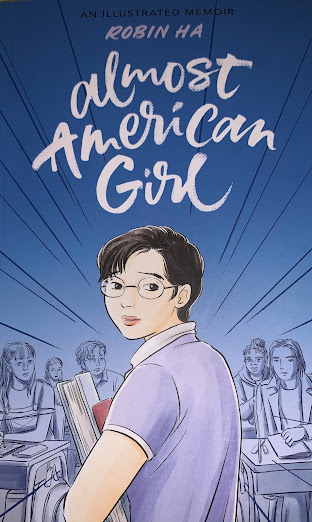All Boys Aren't Blue
"Navigating in a space that questions your humanity isn't really living at all. It's existing. We all deserve more than just the ability to exist" (Johnson M. 75)
 |
George M Johnson (They/Them) |
2. George M. Johnson's Interview with NPR - In an interview with NPR’s Petra Mayer, All Boys Aren’t Blue’s author, George M. Johnson, discusses the importance of creating literature which younger generations can relate their struggles to, expressing how young adult literature of this tone was uncommon during their adolescence.
3. "Growing Up Black and Queer" - Human Rights Campaign - In his guest column for the Human Rights Campaign in honor of Black History Month, actor and playwright Jeremy O. Harris reflects on his personal difficulties growing up as an African-American man who identified as a member of the LGBT community, an upbringing similar to that of George M. Johnson.
4. “"The rise of young adult books with LGBTQ characters - and what's next" - NBC News - Gwen Aviles writes for NBC News about the widespread expansion of the young adult literary genre to accommodate the stories of LGBT individuals. However, despite the genre’s recent embrace of the LGBT community, she examines the genre and how it still lacks prevalently in some aspects of queer representation.
5. “What one American realized about growing up Black and queer” - Good Morning America - While discussing Gabrielle Union’s decision to adapt All Boys Aren’t Blue for television, author George M. Johnson talks with Good Morning America about the struggles they faced in their upbringing as a member of the LGBT community and the importance of their memoir for children facing similar struggles today.
6. "LGBT and Black authors targeted with hate on Goodreads” - PinkNews - All Boys Aren’t Blue’s author identifies as both African-American and queer. In recent news, many readers have purposely criticized authors of both communities on popular book review sites, such as Goodreads, and reaffirming once more the bias of literature as a whole and the lack of adequate representation Johnson sought to dismantle.
Preview/Objective:
Students will explore the main theme of the memoir All Boys Aren’t Blue and connect it to their own exploration of identity through a choice board.
California Common Core Standards:
- CCSS Reading Standards 1 - Cite strong and thorough textual evidence to support analysis of what the text says explicitly as well as inferences drawn from the text, including determining where the text leaves matters uncertain.
- CCSS Reading Standards 2 - Determine two or more themes or central ideas of a text and analyze their development over the course of the text, including how they interact and build on one another to produce a complex account; provide an objective summary of the text
- CCSS Writing Standards 1 - Write arguments to support claims in an analysis of substantive topics or texts using valid reasoning and relevant and sufficient evidence. Write informative/explanatory texts to examine and convey complex ideas, concepts, and information clearly and accurately through the effective concepts, and information clearly and accurately through the effective selection, organization, and analysis of content. selection, organization, and analysis of content.
- CCSS Writing Standards 7 - Conduct short as well as more sustained research projects to answer a question (including a self-generated question) or solve a problem; narrow or broaden the inquiry when appropriate; synthesize multiple sources on the subject, demonstrating understanding of the subject under investigation.
- CCSS Speaking and Listening Standards 1 - Initiate and participate effectively in a range of collaborative discussions (one-on- one, in groups, and teacher-led) with diverse partners on grades 11–12 topics, texts, and issues, building on others’ ideas and expressing their own clearly and persuasively.
Resources and Preparation:
- An example choice board to help students with their project:
 |
| Choiceboard Example |
- A brief powerpoint lecture:
Instructional Plan:
Students will read the memoir All Boys Aren’t Blue and will be asked before, during, and after what they think their identity is. Students will also explore what obstacles may or may not come within their identity. George M. Johnson speaks on how growing up Black and queer has impacted their life. Students will be asked to demonstrate the main theme of the novel and tie it to their own life through a creative outlet with the use of a choice board.
Instruction Timeline:
Start of class: Students had a week to read the memoir. They should be prepared to have a discussion in class about the memoir and their own identities.
- 12:00-12:15: Powerpoint presentation on identity (queerness, Blackness, etc)
- 12:16-12:21: Students will have five minutes to silently write their interpretation of the memoir’s purpose/theme and write what they think is their personal identity.
- 12:22-12:32: Students will have 10 minutes to discuss with a partner what they wrote down and ask each other questions on how and why they think the way they do about the memoir and themselves. Can they relate to Johnson? Has it opened their eyes to a new perspective?
- 12:33-12:43: Students will be asked to share their conversations with the class for a 10 minute class discussion.
- 12:44-12:50: Students will be instructed to creatively address their personal connections of the memoir to their own identities through a choiceboard. They will have a week to complete their project.
Johnson, George M. All Boys Aren't Blue: a Memoir-Manifesto. Penguin Books, 2021.
“Journalist. Author. Activist.” GMJ, iamgmjohnson.com/.
Nbjc. “George M. Johnson.” NBJC Ubuntu, 12 Dec. 2020, beenhere.org/2017/10/31/george-m-johnson/.











